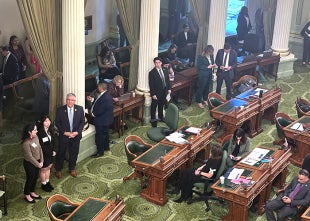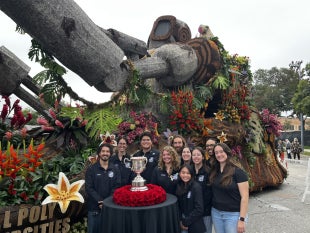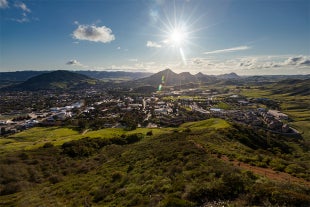Cal Poly Students Create Sustainability Training Program for Campus Peers
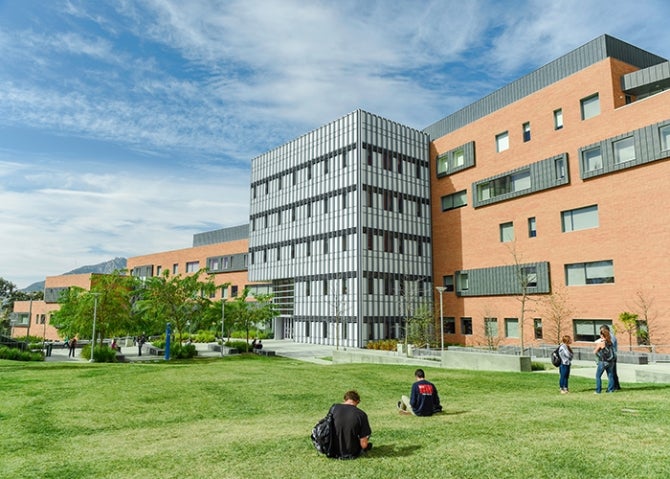
Contact: Kalea Conrad
khconrad@calpoly.edu; 310-283-4183
Sustainable Living Edu Training is Also Offered to Employees, Could Serve as a Model for Other CSU Campuses
SAN LUIS OBISPO — An interdisciplinary team of Cal Poly students has designed a sustainability training program aimed at raising awareness and changing behaviors among their campus peers.
The 30-minute training, Sustainable Living Edu, which is offered to all incoming students, broadly addresses sections on consumption and fossil fuels, water, transportation and waste management. Continuing graduate students as well as university employees can also access the training. And the students hope it can expand to serve as a model for other California State University campuses, from San Diego to Eureka.
“It is a student-led effort to prioritize sustainability at Cal Poly and establish a culture of environmental awareness, stewardship and involvement among all students, staff and faculty,” said Kalea Conrad, a graduate student seeking a master’s in environmental sciences and management.
The prototype was produced in the spring of 2022 during the Hermosa Beach, California, resident’s final quarter of her bachelor’s in environmental management and protection at Cal Poly. It was the culmination of the quarter-long, seven-person group project in Environmental Design 408 course: Implementing Sustainable Principles, a sustainable environments minor course offered by the College of Architecture and Environmental Design.
The multidisciplinary team, of various majors but whose studies also included a sustainable environments minor, also included: Conor Kelly, a Redondo Beach, California, resident, (Environmental Management and Protection, ’23); and four 2022 architecture graduates, Ashlynne Yap of San Jose, California; Alexa Jacobson of Benicia, California; Grace Lauer of Edina, Minnesota; and Mereck Palazzo of Chelan, Washington.
In fall of 2022, she and Annika Furr, who adapted the training prototype onto the formal Skillsoft platform as her senior project, worked to research, edit, refine and produce high-quality, informational training videos. Furr, of Burlingame, California, is graphic communications major that graduated in 2022, and is pursuing a master’s degree in global sustainable business management at the Amsterdam University of Applied Sciences and Northumbria University.
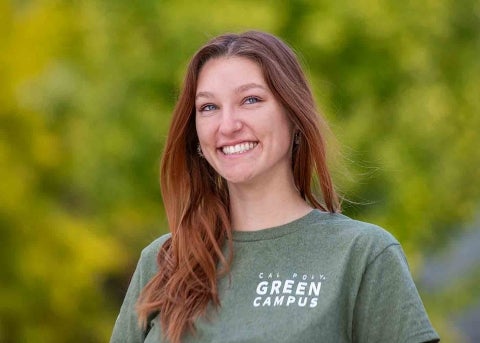
Photo by Jay Thompson
The aim of the training is to communicate the necessity for focus on environmental preservation among all students and disciplines, not only College of Agriculture and Environmental Sciences or College of Architecture and Environmental Design majors. With significant input from project advisors, professors, Cal Poly Sustainability Coordinator Kylee Singh and many others, the pair fine-tuned the script and videos were recorded in collaboration with Cal Poly theater students.
The training was first included in the New Student and Transition Programs Toolkit that went live for incoming students to access from August 2022 through last September. (It is currently available through the “Skillsoft for Students” tab (at the left-hand side) of the Cal Poly portal under the “Custom” link.) Additionally, it is housed in the Food and Living section of the Sustainability website (linked below).
Conrad and her team created the training to establish a common understanding of the concept of sustainability. They hope that sustainability concepts like those covered in the training can be a greater focus in disciplines across Cal Poly’s six colleges.
This pilot training program broadly addresses consumption and fossil fuels, transportation, water and waste management, while including a variety of additional optional resources for students to engage in efforts both on and off campus. And she hopes to expand the effort statewide.
“It is currently an optional training at Cal Poly, yet with sustained effort, we’re striving to ensure it is the first sustainability training in the California State University system — the largest in the nation, with 23 campuses and nearly 460,000 students from diverse backgrounds — and inspire other CSU campuses to adopt their own locally relevant sustainability training,” Kalea said.
The Sustainable Living Edu training, by the nature of its student-led creation, is specific to the community of San Luis Obispo. Its creators recognize the training will need to be adapted or recreated entirely to address the unique status of waste management guidelines and other sustainability efforts relevant to the other CSU campuses. Conrad and Furr recognize that the greatest challenge for this training is that it is currently optional, and there are few ways to engage returning students with training content beyond CSU-mandated trainings.
For more Cal Poly sustainability efforts, visit:
https://afd.calpoly.edu/sustainability/campus-action/food-living.

